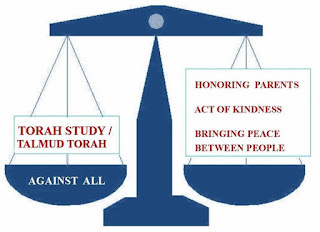Talmud Torah Keneged Kulam!
The phrase Talmud Torah k’neged kulam, "the study of Torah is equal to everything," is well known from its daily recital in the morning prayers:
These are the things which man performs and enjoys their fruits in this world, while the principal remains for him in the World to Come: honoring one’s parents, bestowing kindness, arriving at the study hall early in the morning and evening, welcoming guests, visiting the sick, assisting a bride, escorting the dead, contemplation of prayer, and making peace between man and his fellow. And the study of the Torah is equal to them all.
This phrase is commonly cited as a trump card for shutting down any discussion relating to people's obligations:
"Shouldn't men work to support their families, rather than staying in Kollel?"
"Talmud Torah k'neged kulam!"
"Should people give their children an education that enables them to earn a living, as Chazal instruct?"
"Talmud Torah k'neged kulam!"
"Shouldn't the burden of military service and supporting the economy be shared across society in Israel?"
"Talmud Torah k'neged kulam!"
While the idea that Torah is equal in value to all other mitzvot put together is not necessarily related to the mystical outlook, it does dovetail with it. After all, from a rationalist perspective, while Torah is extremely important in terms of its instructional and educational value, it is difficult to see why it would be equal in value to all other mitzvot put together. Whereas if learning Torah is of mystical significance, then this can easily be proposed to be equal to all other mitzvot combined.
Yet in practice, nobody, and certainly not Chazal, ever took Talmud Torah k'neged kulam to mean that any given moment of Torah study is equal in value to all other mitzvot combined. If they did, then there would never be grounds to do an optional mitzvah, much less to institute any kind of non-critical act, religious or otherwise, that could take people away from a moment of Torah study.
Furthermore, it is important to note that there are several mitzvot about which Chazal say that they are equal to all other mitzvot together:
Shabbos is equal to all the mitzvot of the Torah. (Yerushalmi, Berachot 9a)
Great is circumcision, for it is equal to all the mitzvot of the Torah. (Yerushalmi, Nedarim 12b)
The mitzvah of tzitzit is equal to all the mitzvot of the Torah (Nedarim 25a, Menachot 43b)
Charity and bestowing kindness are equal to all the mitzvot of the Torah (Yerushalmi, Pe’ah 3a)
Settling the land of Israel is equal to all the mitzvot of the Torah. (Tosefta, Avodah Zarah 5)
Now, it is logically impossible for all these things to be equal to all other mitzvot! Thus, the phrase k’neged kulam cannot be interpreted literally to mean that they are equal to all other mitzvot.
Most significantly, the version that we say in Shacharit, which has a long list of mitzvot regarding which it is said that Talmud Torah K'neged Kulam, is not the original text. Rather, it is an expansion of the original text, which is a Mishnah in Pe’ah. That Mishnah lists three mitzvot, and then says Talmud Torah k'neged kulam:
These are the things which man performs and enjoys their fruits in this world, while the principal remains for him in the World to Come: honoring one’s parents, bestowing kindness, and making peace between man and his fellow. And the study of the Torah is equal to them all. (Mishnah, Pe’ah 1:1)
Now, the significance of realizing that this is the underlying source for Talmud Torah k'neged kulam is that this text also has a corresponding text regarding sins, which states as follows:
And correspondingly, these are the things for which a person is punished in this world, while the principal remains for him in the World to Come: Idolatry, forbidden relationships and murder. And lashon hara (evil speech) is equal to them all. (Yerushalmi, Peah 4a; Tosefta, Pe’ah 1:2)
What are we to make of this? Lashon hara is very bad, but it is certainly not worse than idolatry, adultery and murder! Clearly, the point is to emphasize the severity of lashon hara, which can be far-reaching in its effects.
Thus, when Chazal say that lashon hara is equal to idolatry, adultery and murder, this is not meant to be understood literally. Likewise, when Chazal say in the corresponding text that Talmud Torah is equal to all other mitzvot, it is likewise not meant to be understood literally.
Having said all that, what does Talmud Torah k'neged kulam actually mean? It means that it is of foundational significance vis-a-vis mitzvot, just as lashon hara is of foundational significance vis-a-vis sin. It is the same as the discussion in Kiddushin 40b, where the consensus is that study is greater than action—and the reason given is that study leads to action. Rambam explicitly explains Talmud Torah k'neged kulam this way:
And when you investigate this matter, you will find that Talmud Torah is weighed as equivalent to everything, because through Talmud Torah a person merits all these [mitzvot in the list], just as we explained at the beginning—that study leads to action. (Rambam, Commentary to the Mishnah, Pe’ah 1:1)
There are “regular” mitzvot, like blowing shofar, shiluach hakein, building a sukkah, etc. And there are especially significant mitzvot, described by Chazal as being “equal to all others,” such as circumcision, Shabbos, charity, and settling the land of Israel. Of the especially significant mitzvot, learning Torah is unique. But this is (primarily) because, as Chazal say, "study leads to action."
(Extracted from my forthcoming book, Rationalism vs. Mysticism: Schisms in Traditional Jewish Thought)
Reminder: You can subscribe to this blog via email using the form on the right of the page. Or send me an email at director@biblicalnaturalhistory.org and I will add you.



